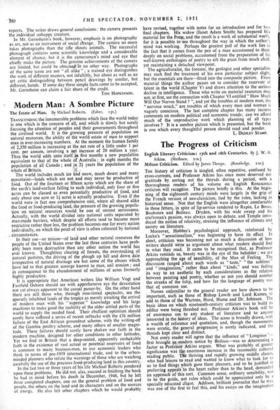Modern Man: A Sombre Picture
The Estate of Man. By Michael Roberts. (Faber. i ss.) • TRANSCENDING the innumerable problems which face the world today is one which is the concern of all; and, which is slowly but surely focusing the attention of peoples and their governments throughout the civilised world. It is the &owing pressure of population on natural resources, the ability of the world estate of man to support man in ever-increasing numbers. At the moment the human family of 2,350 million is increasing at the net rate of a little under 1 per cent. per annum, involving a net increase of 20 million a year. Thus the world adds unto itself five months a new populatiOn equivalent to that of the whole of Australia ; in eight months the population of all Canada ; and in 21 years the population of the whole of Britain.
The world includes much ice and snow, much desert and many mountains—lands which are not and may never be productive of food. Out of the fourteen or fifteen acres which are the share of the earth's land-surface falling to each individual, only four or five acres can be classed as even potentially productive of food, and only about one acre or 1+ acres is actually productive. Even if the world were in fact one comprehensive unit, where all shared alike the food or food-producing land, the pressure of the growing popula- tion on natural resources would be one of utmost seriousness. Actually, with the world divided into national units separated by man-made barriers, which despite all' efforts tend to become more restrictive rather than less, the problem becomes one for every nation individually, on which the point of view is often coloured by national , circumstances.
In their use—or misuse—of land-and other natural resources the people of the United States over the last three centuries have prob- ably been more destructive than any other nation the world has ever known. Thoughtless clearing of forests, the overstocking of natural pastures, the driving of the plough up hill and down dale irrespective of natural drainage are but some of the abuses which have led to that greatest scourge known to man, soil erosion ; and in consequence to the abandonment of millions of acres formerly highly productive.
It is appropriate that American writers like William Vogt and Fairfield Osborn should see with apprehensive eye the devastation not yet always apparent to the casual passer-by. On the other hand there are still those who, through "rose-tinted spectacles, see the sparsely inhabited lands of the tropics as merely awaiting the arrival of modern man with his " superior " knowledge and his large machines to make good the inability of the older settled parts of the world to supply the needed food. Their ebullient optimism should surely have suffered a series of recent setbacks with the £36 million failure of the East African groundnut scheme, with the writing-off of the Gambia poultry scheme, and many others of smaller magni- tude. These failures should surely have shaken our faith in the modern machine, designed for other conditions in other latitudes. Yet we find in Britain that a deep-seated, apparently unshakable faith in the existence of vast actual or potential reservoirs of food is common to many business-men, to our economic leaders who think in terms of pre-1939 international trade, and to the urban- minded planners who refute the warnings of those who are watching carefully the use of the precious food-producing land in this country. In the last two or three years of his life Michael Roberts pondered upon these problems. He did not, alas, succeed in finishing the book he had in mind before his death in December, 1948, but he left three completed chapters, one on the general problem of food and people, the others on the land and its characters and on the sources of energy. He also left other chapters which he would probably have revised, together with notes for an introduction and for two final chapters. His widow (Janet Adam Smith) has prepared this material for the Preto, and the result is a work of substantial worth, for it is possible to "see throughout the way in which the author's mind was working. Perhaps the greatest pull of the work lies in the fact that it comes from the pen of a man accustomed to think deeply on social problems, accustomed from the preparation of his well-known anthologies of poetry to sift the grain from much chaff. yet maintaining a detached viewpoint.
The agriculturalist, the forester, the geologist and other specialists may each find the treatment of his own particular subject slight, but the essentials are there—fitted into the composite picture. From material things the author passes on to consider the reservoir of talent in the world (Chapter V) and draws attention to the serious decline in intelligence. Those who write on material resources may not; at first, see the connection with Chapter VI entitled " How Much Will Our Nerves Stand ? ", and yet the troubles of modern man, the "nervous wreck," are troubles of which every man and woman is vaguely conscious. The last complete chapter has many incisive comments on modern political and economic trends: can we afford much of the unproductive work which planning of all types involves ? It is a sombre picture which is presented, but the book is one which every thoughtful person should read and ponder.
L. DUDLEY STAMP.


































 Previous page
Previous page